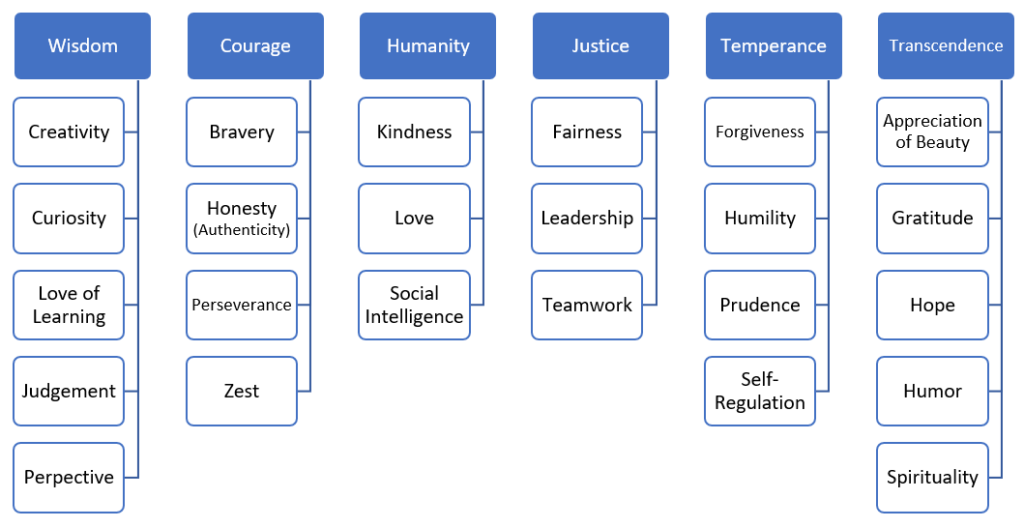
Character Strengths and the Virtuous Life
The ultimate goal in positive psychology is to help individuals and communities thrive. We thrive by maximizing our character strengths in pursuit of well-being. Read my post on Well-Being and the Five 'Happy' Lives to learn more about well-being. To read all about Character Strengths, get the original book on the topic, Character Strengths and Virtues: A Handbook and Classification by Peterson & Seligman (2004).
 So what are character strengths and how do we use them to improve well-being? I see character as a representation of who we are as individuals - our core self. The term personality may pop up here since we are talking about what makes each of us unique and personality and character are described similarly but personality is about how others see us - an outgoing personality, for example - while character is more about who we are on the inside - our true-self. We don't always express our character, it may come out in different ways, and it may not even be very obvious to ourselves.
So what are character strengths and how do we use them to improve well-being? I see character as a representation of who we are as individuals - our core self. The term personality may pop up here since we are talking about what makes each of us unique and personality and character are described similarly but personality is about how others see us - an outgoing personality, for example - while character is more about who we are on the inside - our true-self. We don't always express our character, it may come out in different ways, and it may not even be very obvious to ourselves.
Positive psychology posits that character is made up of our unique strengths - those aspects of the self that are congruent with who we are - they include the talents we were been born with, the beliefs and values we develop as we experience life, and the skills we've mastered that help us get the most out of life.
So character strengths are those core aspects of the self that propel us forward. They aren't yet actionable - we'll talk about that later - but they can be used together help you live what Seligman refers as the Virtuous Life. Which brings us to our next term - Virtue.
To live a virtuous life often conjures up images of 'virtuous' individuals - perhaps those who made great sacrifices for the greater good or who's life work changed the lives of others - you may think of people like Gandhi, Mother Teresa, or Martin Luther King. And you would be right. These individuals certainly led virtuous lives.
 In positive psychology, being virtuous means living the life that best suits who you are - your character. It means being true to yourself, amplifying what is good, and moving toward your goals. It means identifying your signature strengths, amplifying them in pursuit of well-being, and engaging in activities that propel you forward.
In positive psychology, being virtuous means living the life that best suits who you are - your character. It means being true to yourself, amplifying what is good, and moving toward your goals. It means identifying your signature strengths, amplifying them in pursuit of well-being, and engaging in activities that propel you forward.
Martin Luther King was virtuous because he used what I would consider his signature strengths of bravery, hope, and fairness to move the world forward toward equity and fairness. Similarly, Gandhi used his strengths of hope and spirituality to counter tyranny. And Mother Teresa used her strengths of kindness and love to care for those most in need. She said it best herself - "it doesn't matter how much you do but how much love you put into what you do that counts." She knew that her strength was love and she used that strength to make a lasting positive difference in the world.
Our signature strengths work in tandem and cluster together. It is easy to see how Mother Teresa's strengths of kindness and love are related. By looking at how our signature strengths cluster, we can better understand what it means for us to live a virtuous life. For her, both kindness and love are character strengths in the Virtue of Humanity and this is where Mother Teresa thrived.
The image below shows the 24 character strengths and how they often cluster together within one of six virtues.
The Virtue of Wisdom and Knowledge relates to cognitive aspects and how we use our information to improve our well-being. Strengths in this virtue focus on an individual's passion for building knowledge through creative and open minded approaches and using this knowledge to improve the wellbeing of the self and others. Specific strengths include:
- Creativity - Drive to look for new ideas or approaches
- Curiosity - Interest in gaining knowledge, learning knew things, understanding
- Love of Learning - motivation to learn, to continually gain knowledge
- Judgement, or Open Mindedness - actively seeking evidence for and against
- Perspective - diversity of understanding and sharing with others
The Virtue of Courage relates to the exertion of effort when faced with difficulty. Strengths focus on standing strong, being true to the self, following through and jumping in with both feet. Specific strengths include:
- Bravery - standing strong against adversity
- Honesty - being authentic with self and others
- Perseverance - persisting, following through to completion
- Zest - passion, jumping in with both feet
The Virtue of Humanity relates to relationships and being caring and focusing on others. Strengths focus on a desire to help others, mutual caring and sharing, and strong relational and interpersonal skills. Specific strengths include:
- Kindness - desire to be helpful to others, looking for and acting on ways to be kind to others
- Love - mutual caring and sharing, giving and receiving warmth and love
- Social Intelligence - strong interpersonal and intrapersonal skills, understanding of others' feelings
The Virtue of Justice relates to social justice in the community and the world around us. Strengths focus on treating all people equally, helping others be productive and successful, and working collaboratively. Specific strengths include:
- Fairness - treating everyone equally without prejudice, applying rules equally
- Leadership - helping others be productive, building collaboration and good relationships between others
- Teamwork - being team oriented, working on common goals, doing your part
The Virtue of Temperance relates to finding balance and avoiding harmful extremes. Strengths focus on forgiveness, self-care and risk avoidance, and a sense of self-control. Specific strengths include:
- Forgiveness - countering negative emotions toward others, learning from past transgressions
- Humility - lack of need for personal recognition or to be the center of attention, countering arrogance in the self
- Prudence - being careful and cautious, avoiding excessive risk, planning
- Self-Regulation - possessing self-discipline, being in control of one's feelings and actions
The Virtue of Transcendence relates to one's connection to the world and finding meaning. Strengths focus on being mindful and thankful, seeing the future as positive, and having a higher purpose. Specific strengths include:
- Appreciation for Beauty and Excellence - being mindful and appreciative of the world around us, including the skills of others
- Gratitude - being thankful for the good things, expressing thanks to others
- Hope - believing the future is positive and that one has the skills to bring about a good future
- Humor - seeing the lighter side of life, being playful, finding humor in stressful times
- Spirituality - having a sense of purpose, seeing self as part of a bigger picture, finding meaning in everyday life
While there are 24 character strengths, there are often a few that are predominant in you and that, taken together, represent a large portion of who you are as a person. These top character strengths are referred to as your signature strengths and we can increase well-being by identifying and amplifying these signature strengths. Many people find that their signature strengths cluster within a single virtue. Others may see theirs crossing over two or three virtues. Still others find their signature strengths to be scattered across many virtues, creating an individual virtue or hybrid virtue.
In the video below, Dr. Ryan Niemiec, director of education at the VIA Institute on Character, talks about the importance of character strengths and how you can use them to enhance your life.
What are your signature strengths? Do they cluster around one of the six virtues or do they create a virtue that is unique to you? Knowing your strengths, how can you use them to live a more virtuous life? What can you do today that maximizes your strengths and improves your well-being?
References
Peterson, C., & Seligman, M. E. P. (2004). Character strengths and virtues: A handbook and classification. American Psychological Association; Oxford University Press
VIA Institute on Character (n.d.). VIA Character Strengths Survey. Retrieved from https://www.viacharacter.org/).
